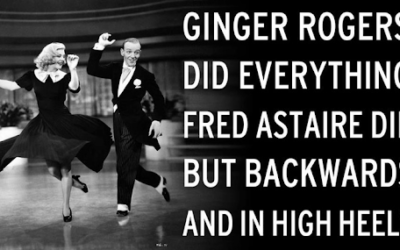I hate Women’s History Month. Don’t get me wrong; I think it’s vitally important to keep remembering that – and why – women matter. It’s crucial that we keep examining and updating our perceptions of women, so that we see them in ways that are ever-more complete, current and correct. I just don’t think that Women’s History Month (“WHM”) accomplishes these ends very well. Unfortunately, WHM is often reduced to an annual box-checking exercise that masquerades as a demonstration of commitment to women.
I should know. I used to be a Diversity officer for a large organization. The traditional observance of WHM was this: We went into our storage closets and dusted off a bunch of yellowed lithographs of exceptional women. We put the photos up in the hallways (and removed them promptly on April 1st). We held a lunch and brought in a speaker or two to motivate and educate. Usually, the only people in the audience were women. And then we crossed off the “Women-valued-for-this-year” item on our organizational to-do list. We meant well, but I don’t think we helped anyone. Even though it was totally unsatisfying, I never figured out how to do something more meaningful. The only option I saw was to discontinue the charade.
Today, 25 years later, I believe that we should celebrate Women’s History Month (and every other “History Month”) by agreeing to make ourselves and each other uncomfortable. I would like to see March become an annual invitation to reengage, refresh and reexamine our collective narrative about women. I’d like it to be the month where leaders of both genders come together to assess where women actually stand in their organization, community or country. Where are we with parity, really? What advances can we celebrate, and how do we replicate and increase them? Where are the gaps between what we say we believe and what we actually do? How do we find that out? What subtle and obvious barriers must women negotiate that their male counterparts do not? What are the organizational ‘clubs’ and power centers in which women still have reduced access or sway? What are the beliefs, behaviors and systems that accomplish this exclusion? When we look at our key strategic challenges, what could women’s perspectives and skill bring to the table that we may be missing?
Women’s History Month is also an invitation for us women to enter into our own discomfort. March is as good a time as any to evaluate ourselves as unflinchingly as we wish our organizations would evaluate themselves. Are there ways in which I have held myself back from making my own small history? Are there situations in which I routinely choose comfort over challenge? Are there necessary battles that I’ve backed away from? Or fights I’ve been fighting ineffectively or for too long? Are there places in which I have abandoned my own vision, principles or well-being in order to keep the waters calm? Are there younger women around me who are withering, either from the absence of a mentor or from active sabotage? Are there some paths that I could clear so that other women can make their own history?
Men… you too. Are you relaxing your attention on parity, since the tides of favor and power are starting to shift? Do you levy criticisms against women that you don’t levy against men? Do you hold women in your sphere to higher or lower standards than the men? What one step could you take to check that your impact on women aligns more fully with your best intentions?
Avoid the token nod to Women’s History. Organizations, beware self-satisfaction because you hired a lunchtime speaker. Women, resist viewing March as a a month of sanctioned victimhood. Men, nap not on your laurels. For Women’s History Month, let’s put ourselves on the hook for real dialogue and meaningful change. Let’s be willing to get uncomfortable this month and see what happens.
This post originally posted on Leading With Grit and Grace.
Guide to Women in Leadership
Organizations with women in their executive suites regularly out-perform others. Yet rising female executives (and their mentors) are frustrated at how hard it is to break through the glass ceiling. In this extensive guide, Executive Coach Dana Theus shares her tried and true strategies to help women excel into higher levels of leadership and achieve their executive potential.






